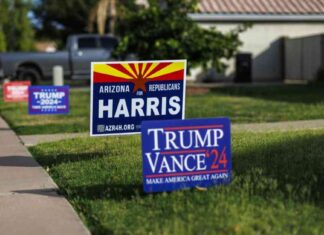As we navigate the complex landscape of patriotism in today’s political climate, it is crucial to examine the shifting dynamics within the two major parties in the United States. The traditional notions of patriotism and what it means to love one’s country have been at the forefront of recent discussions, particularly in the wake of the Democratic National Convention. The Democrats’ efforts to reclaim patriotism from the Republicans have sparked a renewed sense of national pride and unity, challenging the long-standing narrative that the GOP has a monopoly on patriotism.
The Vietnam War era was a time of intense ideological conflict, with protests and demonstrations shaking the foundation of American society. Bumper stickers became a battleground for opposing viewpoints, as supporters of the war proudly displayed slogans like “America: Love It or Leave It,” while anti-war activists countered with messages of “America: Change It or Lose It.” This period of division highlighted the diverse interpretations of patriotism and underscored the fact that no single political party can claim exclusive ownership of this complex and multifaceted concept.
The recent Democratic National Convention provided a platform for party members to express their deep-seated love for their country and to challenge the narrative that Republicans are the sole purveyors of patriotism. Michigan Rep. Elissa Slotkin, a former CIA officer who served in Iraq, emphasized the importance of proudly claiming one’s patriotism and not allowing pretenders to hijack the values that the flag represents. The Democrats’ unequivocal embrace of patriotism caught many Republicans off guard, as they watched their traditional themes of faith and patriotism being appropriated by the opposing party.
The transformation of the Republican Party under the leadership of former President Trump has upended long-held beliefs about the party’s core values. Once defined by principles of strong national defense, free-market capitalism, lower taxes, and limited government, the GOP has evolved into a vehicle for Trump’s unpredictable and often contradictory impulses. Trump’s shifting stance on issues like abortion and immigration has exposed the lack of consistent ideology within the party, as he prioritizes political expediency over principled governance.
Loving one’s country requires a nuanced understanding of its history and a willingness to confront its shortcomings alongside its triumphs. The ability to hold contradictory views of America, recognizing its foundation in both freedom and slavery, is a hallmark of true patriotism. The symbolic significance of the American flag is not diminished by the act of burning it, as affirmed by a 1989 Supreme Court ruling that upheld the constitutional right to do so. Even conservative Justice Antonin Scalia acknowledged this right, despite his personal distaste for such actions.
In the aftermath of the 9/11 attacks, a wave of patriotic fervor swept across the nation, uniting Americans in a shared sense of solidarity and pride. Flags flew high, adorning cars, homes, and buildings as a symbol of resilience and unity in the face of tragedy. However, the ensuing conflicts in Iraq and Afghanistan tested the limits of this unity, revealing deep divisions within the country and challenging the notion of a cohesive national identity.
President Obama’s decision to forego wearing a flag pin during his first White House run sparked controversy and criticism from his opponents, who sought to portray him as unpatriotic. Obama’s response, emphasizing that true patriotism is demonstrated through actions rather than symbols, resonated with many Americans who recognized the importance of upholding values and ideals in the pursuit of a more perfect union. This sentiment echoes today as we grapple with the complexities of patriotism in a deeply polarized political landscape.
The recent resurgence of patriotism within the Democratic Party reflects a broader shift in the political landscape, as Democrats seek to reclaim the narrative of what it means to love one’s country. By embracing symbols of national pride and emphasizing the inclusive nature of patriotism, Democrats are challenging the traditional stronghold that Republicans have held on this issue. As we continue to navigate the complexities of patriotism in the modern era, it is essential to remember that love of country transcends partisan divides and requires a commitment to upholding the values that define us as a nation.



























